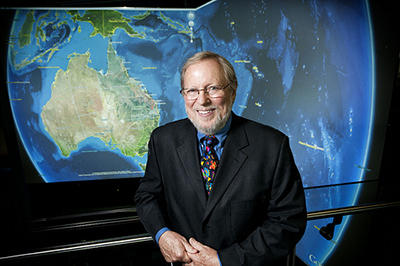Queensland to spearhead the world’s spatial revolution
A QUEENSLAND-based researcher is spearheading the transformative global spatial information drive emanating out of Australia. It is an area of digital information matching that will become increasingly important to business.
Queensland University of Technology (QUT) has appointed world-renowned environmental scientist Tim Foresman as its inaugural SIBA chair in spatial information, a position co-funded by the university and the Spatial Industries Business Association (SIBA). 
Dr Foresman is best known for his leadership of NASA’s Digital Earth Initiative which helped pave the way for Google Earth. He will spend the next several years building a critical mass of spatial information expertise in Queensland – and QUT believes that process will change the way the world is viewed in many respects.
According to QUT, spatial information is also powering a revolution that will help humanity rein in it resource excesses and help guide it to a sustainable future.
“About 90 percent of all data is spatial in nature – consumer buying habits, land valuations, electricity and phone usage, tax revenues and spending within electorates, population demographics, economics – you name it,” Dr Foresman said.
“We can capture those geographical elements in data and map them out to more easily visualise what that data is telling us. And when we can visualise information, then we can gain a well-informed consensus out of a group of people who might otherwise be divisive.
“This is the magic of the spatial revolution – the visualisation of information enables humans to sit down and make reasonable decisions about the world we live in. It empowers us to understand the value of the everyday decisions we make as individuals or communities.”
As the SIBA chair at QUT, Dr Foresman will focus on driving the spatial revolution in the business and government domains, showing them how cutting-edge spatial information research can be applied to existing and new decision-making tools.
He said the unique industry-endowed position is designed to increase the academic focus to real and imminent challenges facing our society and build the key business relationships to build the economy.
Much of Dr Foreman’s work will build on the vast amount of spatial information now publically available through the Queensland Global application, the Queensland Government’s pioneering interactive online tool that allows the public to easily access a range maps, imagery and government-owned data.
“Spatial information is the key to making informed decisions that benefit all sectors of business, government and the community,” Dr Foresman said.
“For instance, a city facing congestion problems can use spatial information to determine if congestion would be best combatted by spending millions in tax revenue building a new superhighway or the same amount on a stronger public transport system.
“In agriculture, farmers could be using a variety of spatial information – satellites, in-field sensors, environmental monitoring – to reduce fertiliser and water wastage for example, and optimise the productivity of the whole industry.”
Dr Foresman predicted a near future of unprecedented transparency in government information, where residents have a true bird’s-eye view of their world and how it interacts with all other government business.
He wants to see a future in which all citizens actively engage with government and business to make sure they are receiving the best service.
“Has a power line come down in a storm? Take a photo on your smart phone and send it straight to the utility so it will repair it promptly. Hooligans spray painting the wall across the street? Snap a pic and send it to the police,” Dr Foresman said.
“This isn’t a future where Big Brother is watching you – this is family looking out for each other. And when everyone in the community has each other’s backs, we all have much more time for leisure, be it a cricket match at the Gabba or barbeque with friends in the park.”
Leading a global charge to better manage the planet’s resources is undeniably a difficult task, but no one is more qualified to do it.
As the United Nations’ chief environmental scientist, Dr Foresman oversaw annual Global Environmental Outlook (GEO) reports that rated the conditions of the planet and its resources.
“The first GEO report card I delivered back in 2002 contained two Ds and the rest where Fs – and they’ve only become worse since then,” he said.
“It was blatantly obvious to me even back then that this planet we’re living on has finite resources and we’re overtaxing them.
“If we want to enjoy life as we currently know it and act responsibly by leaving it in better shape for our children and their children, we need a game changer that will allow us to preserve and maintain this planet – and that game changer is spatial information.
“The Queensland Globe is a fantastic start because we have all the ingredients here to make a quantum leap in using spatial information and to lead the Australian and global communities by example.”
Dr Tim Foresman will present on the spatial revolution and the evolution of big data research at the next Innovation Series event in Brisbane on August 8 at the Stamford Plaza Hotel. The event covers the topic Big Data: A Catalyst for Business Success and also features one of Australia's leaders in the field, Quantium director Tony Davis.
ends

 How to resolve AdBlock issue?
How to resolve AdBlock issue?